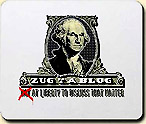The Pulitzer Corpse
First, because you won't see it otherwise, and secondly, this is the untold story about how a single moment can overshadow an entire lifetime -- and mark the reporter who broke the story for a lifetime, as well.
Consider, if you will, the current cover story of NEWSWEEK (Men and Depression), what happened to Buzz Aldrin when he got back from the moon (specifically, how he was shunted out of the Air Force when it became known he'd seen a psychiatrist for -- understandable -- depression). And how, in that story you haven't seen much of, the great former Senator from Missouri, Thomas Eagleton, was once, for a few hours, George McGovern's running mate against Richard Nixon, Spiro Agnew, and his minions of Evil in the 1972 Presidential Election. [Trivia question: who ended up being the Veep nominee?]
And consider the anonymity of the men who do the reporting, and what a Pulitzer Prize gets you.
Reporter Who Broke Eagleton Story in '72 Reflects On DeathAnd wasn't that a happy story?
Clark Hoyt
By Joe Strupp
Published: March 05, 2007 11:10 AM ET
NEW YORK Clark Hoyt, the veteran newsman who broke the story of Sen. Thomas Eagleton's past psychiatric treatment that led to his being dropped from the 1972 Democratic presidential ticket, said today he never regretted revealing the information that brought the politician down.
As newspapers mark the passing of Eagleton, who died Sunday of heart and respiratory ailments, Hoyt reiterated his long-held belief that disclosing Eagleton's mental health problems and electroshock therapy treament was important information the country needed to know. Hoyt, then a reporter for Knight Newspapers, eventually shared a Pulitzer Prize for his work with then Knight bureau chief Robert Boyd.
"I still think it was a legitimate story and one that still should have been reported and that is what we did," Hoyt said Monday from his home in Virginia. Hoyt, who worked in the Knight Newspapers' Washington bureau until 1976, has since held several editing posts, most recently as Washington editor for Knight Ridder, a job he gave up last year when Knight Ridder was bought by McClatchy. He has since served as a consultant for McClatchy and will spend the upcoming fall term teaching two classes at Davidson College in Davidson, N.C.
Hoyt's role in the Eagleton story began in the summer of 1972 at the end of the Democratic National Convention in Miami. Hoyt had been covering the convention and was due for a vacation when editors sent him to Missouri to dig up everything he could on Eagleton, who had just been nominated.
"While I was in the air flying to St. Louis, an anonymous caller called the Detroit Free Press," Hoyt recalled in an interview last year. The tip: Eagleton had received treatment for depression, including shock therapy. Hoyt landed in St. Louis and immediately went to the St. Louis Post-Dispatch to look through clips on Eagleton. He said he found weeks of gaps in the paper without Eagleton news, "and something about a possible drinking problem." He also discovered reports of a full physical at the city's Mayo Clinic.
Further reporting revealed the name of a doctor who had treated Eagleton, and even a date and place where the shock therapy was administered. Hoyt drove to the doctor's home and asked if the medical information was correct. The response? A slammed door. "That's when I knew it was true, but we still had a heck of a problem getting it into the paper," he said.
Hoyt then phoned Boyd, and the two eventually chose to confront Eagleton with the information in person. Resting up after the convention, Eagleton and McGovern were in South Dakota at a log cabin resort preparing for the upcoming campaign. The reporter and editor flew there and told campaign manager Frank Mankiewicz what they had. The news prompted a sit-down between the candidates and top campaign staffers as Boyd and Hoyt paced outside waiting.
Eventually, Eagleton decided to hold a surprise press conference and reveal his secret. He also gave Hoyt an exclusive interview during his car ride to the Rapid City, S.D., airport immediately afterward. "He looked quite miserable," Hoyt added. Although he felt badly that Eagleton eventually had to leave the ticket, Hoyt was of the opinion that disclosing such serious information was important. "I never had any doubts," he said. "I felt bad for him on a human level. But when you are talking about someone who is going to be a heartbeat away from the presidency, that is something that should be reviewed."
Hoyt said Monday he had seen Eagleton in person just twice since the incident. First, later in 1972, he was with a group of reporters whom Eagleton spoke to about his intention to become a spokesman for mental health issues. "But he never really did," Hoyt said. "Still, he was a very effective senator." Hoyt also said he was seated in a D.C. restaurant at a table next to Eagleton's in 1987, just days after the senator announced he would not seek re-election. "I did not speak to him, though."
An online search of Eagleton obituaries today did not reveal any with a mention of Hoyt or Boyd. But the longtime journalist said that does not matter to him. "I think we got appropriate credit at the time and that is what matters," Hoyt said.
Joe Strupp (jstrupp@editorandpublisher.com) is a senior editor at E&P
The reporter who shared that Pulitzer has been put Out To Pasture by yet another media consolidation ("merger") as the big fish eat the little fish until there are no little fish left.
"He has since served as a consultant for McClatchy and will spend the upcoming fall term teaching two classes at Davidson College in Davidson, N.C."
Sounds like retirement to me. "Consultant" is a fancy term for "on the payroll but with no duties." From Washington D.C. to Davidson, N.C. is quite a trek -- seemingly catalyzed by another merger: from Knight newspapers to Knight-Ridder, to McClatchy without, essentially, changing employers, is a living history of the newspaper business since 1972. And he's been one of the luckier ones. Thanks. See ya. 'Bye.
About DavidsonSuddenly, with Scooter Libby found guilty, and the Walter Reed Hospital scandals heating up, the corpses of Anna Nicole Smith and James Brown are forgotten. And Thomas F. Eagleton, former Senator from Missouri who was, for one brief moment, the Vice-Presidential nominee of the Democratic Party in 1972, gets less press interest than the death of a sitcom actor. Our media values create our media world, after all.
Davidson College is a liberal arts institution founded in 1837 by ministers of the Concord Presbytery. Its 1,700 students come from almost every state in the nation and many foreign countries. A highly selective admission process brings students who are proven scholars and leaders to a close campus community in the small town of Davidson, North Carolina.
Maybe that's why this one sucks.
Courage.
[Trivia answer: Sargent Shriver, the Republican Governor of California's father-in-law.]










0 Comments:
Post a Comment
Links to this post:
Create a Link
<< Home